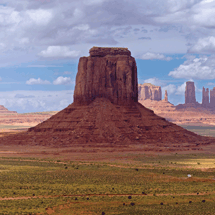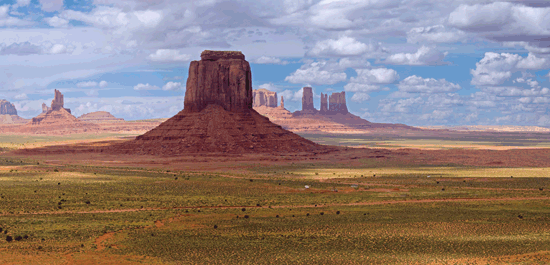 |
The big picture
by Bill Evans
Find out more about Free Will Baptist Foundation at www.fwbgifts.org.
|
I lie flat on my back in a cornfield, double barreled, 12-gauge shotgun across my chest, right forefinger poised for the pull. I shiver, maybe from the December cold, maybe not.
To make myself invisible, I pull dry cornstalks over me to hide my clothes, my head, and my weapon. Two 32-inch barrels, both loaded, modified choke on the right, full choke on the left, two triggers. I am tense but ready.
As a precaution, I have hidden my car off the road a mile away. To my left, I see them—a dozen or more brown and gray specks—too far away to draw a bead on, but moving my way. I mentally check my list. I’m ready…
“Bill, did you hear me? What are you thinking about?” My wife’s voice breaks through my reverie.
“Huh? What? Did you say something?” My mind slowly returns to the interstate and the mundane scenery flashing by. No gun, no field, no ducks…
The truth is, the last time I saw that shotgun was the day I gave it to a friend who had lost home, furniture, clothes, hunting guns, everything, in a house fire in Northern New Hampshire. I think I may have said something like, “I’ve never killed a single duck with it, but it has a powerful kick if that’s what you’re looking for.”
If a man is judged by his guns, I am not sure what mine say about me. I’ve never been an aficionado, but I have owned four. That 12-gauge shotgun, two 22-caliber rifles, and a 22-caliber Ruger handgun built on a Colt 45 frame.
Even though I love western novels with heroes who always prevail over evildoers, and my Ruger looks like a cowboy gun, I am not serious about wanting to be one—a gunslinging cowboy, I mean. Not even a good one, although my wife says that if I had a horse, holster, and eyepatch, I might pass for Rooster Cogburn.

Photo:Monument Valley, Arizona.
However, I am serious about the old, heroic way of doing things. While driving, I study the lay of the land and daydream about how I could take care of myself and others in the case of the unexpected. I try to figure out how to withstand the weather, the varmints, the terrain, and provide food, shelter, and warmth. My dreams are not about being a lone, gun-slinging hero but a steady, ready man who knows what to do and how to do it.
In fact, if I had to describe my hero, I’d say he is not a loner at all, although he is capable of standing alone. If things don’t work, he adapts, accepts hardship, and stands up to the challenge. He can give up food for shelter, warmth for water, the immediate for the long term. He’s willing to lose something now to gain something more important later, if that is what is called for.
I don’t think there is anything wrong with dreaming about guns, wagons, and survival against all odds. In fact, it is good to have ideas brewing in our brains. But after dreaming, you have to get around to doing something. For most of us, that is more likely to involve money than horses and holsters.
I’ll probably never have to make it through scorching desert heat on horseback or stand against the gunslinger in a black hat. But I will have to meet all kinds of other issues head on, some of which will be crises—often financial. You and I both have already felt several money squeezes, endured a few financial strangleholds, maybe even what seemed some hold-ups. For me, surviving those has depended on how well I dreamed and how much I actually did.
Years before retirement, I daydreamed, so to speak, about the lay of the land ahead of me. Not that I figured out everything—I’m a dreamer, not a prophet. But I did what I could based on what I knew and what I had. Three things I acted on: gave more than a tithe to the Lord’s work, put away every dollar I could, and decided what were needs and what were greeds.
I like seeing the grand sweep of things, the panorama. Maybe that’s why I love the West so well with its arid deserts, rugged, sawtooth mountains, and vast wildernesses. And that’s why I like a good western—it’s about large and noble ideals that triumph over weaker, meaner forces of evil.
But the West is also appealing in its smallness. Along a desert roadway a single red-orange poppy thrives in a sandstone crevice. A jackrabbit finds a shaft of shade behind a saguaro. A pronghorn forages on what appears to be a barren desert floor. The small delights me as much as the grand.
That is how I view my financial plans. I’ve looked after small things—the jackrabbits and poppies—but I have also taken stock of enormous mountains as well. Among other things, at retirement I set up a Unitrust at the Foundation. And I’m especially pleased about that because it does three things that are important to me: makes a gift to the Lord’s work after my death, provides income now, and gives me some tax breaks that Uncle Sam offers.
I’m not a hero, but I want to make a difference. I know my Unitrust is just one poppy in a vast desert. It cannot do everything that needs to be done for our denominational agencies, but it can do something. On the other hand, mine and yours and yours and yours can produce an immense field of red-orange blossoms. I just want to do my part beyond today, for the long-term. To me, that’s the panoramic view—the big picture—and I intend to be a part of it.
Daydream, I say, daydream! But at the end of that day be sure you do something.
About the Writer: Bill Evans, former director of the Free Will Baptist Foundation, lives in Catlettsburg, KY. He and his wife Brenda are proud grandparents of seven. To learn more about financial options offered by the Free Will Baptist Foundation, visit www.FWBgifts.org.
|

